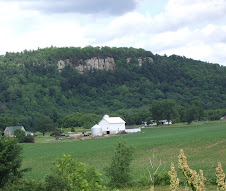As always with sustainable agriculture events in this state, the fair drew a fascinating mix of ol' fashioned farmers, foodie/yuppies like ourselves, hippies, and the various dashed combos of the above (hippie-farmers, yuppie-hippies, yuppie-farmers, foodie-hippies, etc.). It would be very easy to do a rural sociology thesis on the interactions among these strange bedfellows. What do the farmers think of the yuppies with their literary events and "Child Nurturing Tent"? What do the yuppies really think of the farmers - not just the barefoot, liberal, college-educated ones, but the old school, church-going, many-children-having, high-waisted-Lee-jean-wearing, manual-laboring, fifth-generation-on-this-land ones who are mostly in organics because the milk check is bigger? And what does anyone really think about the dude with the sketchy dreadlocked beard that could have been housing several species of rodent? This odd conglomeration is either a brief blip of artificial togetherness that will fade as the food-eating public outgrows the current "green" fad, or it is the nascent networking of a new social order that will move all of us away from a culture and an agriculture of consumerism and degradation to one of respect, sustainability, and community that I believe all of these disparate groups are so diligently searching for. I'm betting my career and my future children on the latter. One can hope.
There was a breakfast, farm and headquarter tours, nature walks, kids' activities, a workshop series, and a whole lot of other things we didn't participate in. We did, however, check out the information and vendor booths (my favorite: the goat cheese fudge + history lesson on the round barns of Vernon County), gaze at antique tractors and other history displays, see the rather paltry animal barn, and eat pretty much every type of food they offered. Our submissions to the suggestions box for next year: more food and some cows to pet.
We saw keynote speaker Jean Feraca, host of NPR's Here on Earth. She addressed the importance of the family table as the center of children's education about food, family, nutrition, civility, and many other topics whose mastery would help the next generation solve problems as diverse as childhood obesity, farm worker rights, and environmental degradation. It was a good talk, if a bit repetitive. Ms. Feraca has many good points, though her speaking style is an acquired taste due to her tendency to sometimes come across as a bit like Janice on Friends.
The true highlight of the day was a reading by Michael Perry, author of Population: 485 and Truck: A Love Story. I previously expounded on his lyrical greatness, and he did not disappoint in person. I laughed and I cried and I enjoyed shutting my eyes just to listen to the rhythm. Wow. He has three main qualities that I envy and seek to emulate:
- He straddles multiple worlds with grace.
- He can write sentiment without sap.
- He is utterly hilarious.











